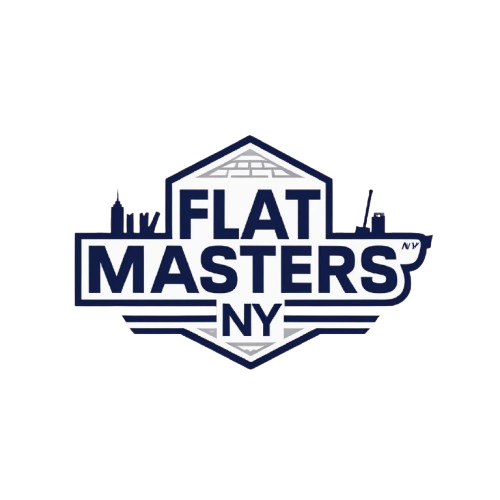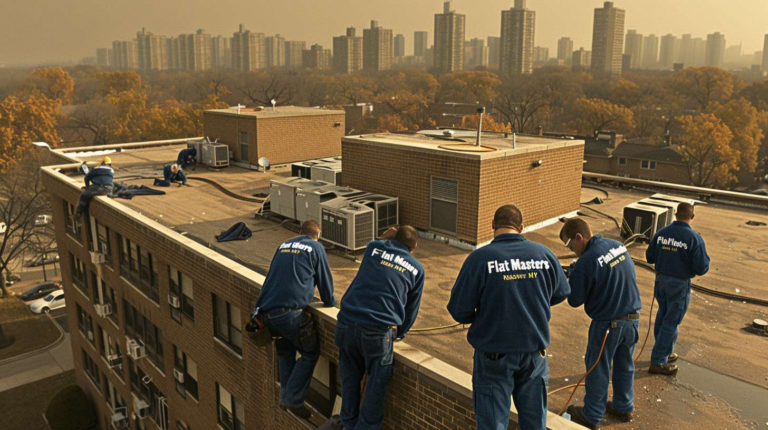Understanding Scuppers on Flat Roofs: Your Complete Guide
Look, I've been installing and fixing scuppers on flat roofs across Queens for over two decades, and I can't tell you how many times I've had to explain what these things actually do. A scupper is basically a drainage opening built into the parapet wall or edge of your flat roof - think of it as your roof's emergency exit for water when the primary drains get overwhelmed.
Here's the thing about flat roofs in Queens - they're not actually flat. We build them with a slight slope (usually 1/4 inch per foot) to direct water toward drains. But when those drains clog up during one of our notorious summer storms, that's when roof scuppers for flat roof systems become your best friend.
What Exactly Are Scuppers and Why Your Flat Roof Needs Them
Every commercial building and most residential flat roofs in New York need secondary drainage. The building code requires it. Scuppers serve as overflow drains, preventing water from pooling and potentially causing structural damage or leaks. I've seen too many roofs in Astoria and Flushing where the owner skipped proper scupper installation thinking they could save a few bucks - trust me, the water damage repair costs way more than doing it right the first time.
There are several types of scuppers we install depending on your building's needs. Through-wall scuppers cut directly through the parapet wall. Overflow scuppers sit at a higher level than your primary drains. Box scuppers create a channel system along the roof edge.
The Real Cost of Scupper Installation in Queens
Installation costs for scuppers typically run between $350-$800 per scupper, depending on the type and complexity. Through-wall scuppers are usually on the lower end since we're just cutting through existing masonry and installing the drain. Box scuppers with custom metalwork can hit the higher range. Last month we did a 12-unit apartment building on Northern Boulevard where the total scupper work came to $4,200 for six overflow scuppers with leaders.
The size matters too. Most scuppers on flat roof installations in Queens use 4-inch or 6-inch openings. Larger commercial buildings might need 8-inch scuppers to handle the volume during heavy rain.
Installation Process - What to Expect
When we install scuppers at Flat Masters NY, the process starts with calculating proper placement based on your roof's drainage area. We typically position them at the low points of the roof where water naturally collects. For through-wall scuppers, we cut the opening, install flashing, and waterproof everything with modified bitumen or EPDM depending on your roof membrane.
The tricky part is making sure the scupper invert (that's the bottom of the opening) sits at the right height. Too high and water backs up before it drains. Too low and you're cutting into structural elements you shouldn't touch.
Oh, and another thing about drainage in Queens - we always install downspouts and splash blocks. The city doesn't want roof water dumping directly onto sidewalks or neighboring properties. I learned that lesson the hard way on a job in Elmhurst about fifteen years ago when the Department of Buildings showed up asking questions.
Common Problems We See with Existing Scuppers
Clogged scuppers are probably the number one call we get during storm season. Leaves, debris, even tennis balls from nearby courts end up blocking the opening. That's why we recommend installing leaf guards or strainers on all scupper installations.
Corroded scuppers are another headache, especially on older buildings near the airports where the jet fuel residue accelerates metal deterioration. We've replaced dozens of rusted-out scuppers in East Elmhurst and Corona over the years.
Sometimes the original installation was just wrong. I can't tell you how many times we've found scuppers installed above the roof level instead of at the proper drainage point. Water finds the easiest path, and if your scupper is sitting high, it's not doing its job.
Maintenance and Seasonal Considerations
Here in Queens, we deal with four distinct seasons that each bring their own challenges. Spring brings leaves and debris from winter storms. Summer means heavy thunderstorms that test your drainage capacity. Fall brings more leaves plus those crazy October storms. Winter? That's when ice dams can form around scupper openings if they're not properly insulated.
We recommend cleaning scuppers twice yearly - once in late spring after the last winter debris clears out, and again in late fall before the real cold hits. It's not complicated work, but you need to check for proper water flow and clear any blockages.
Code Requirements and Permits
New York City building code requires secondary drainage on all flat roofs. The scupper size needs to handle the calculated rainfall load for your roof area. Most residential applications need permits for scupper installation, especially if we're cutting through structural walls. Commercial buildings definitely need permits and usually require an engineer's stamp on the drainage calculations.
As a licensed contractor (License 1456892), I handle all the permit paperwork for our customers. The process usually takes 2-3 weeks if everything's straightforward. Rush jobs cost extra, but sometimes the weather doesn't wait for bureaucracy.
When to Call a Professional
Look, some roofing work you can DIY, but scupper installation isn't one of them. We're cutting through building envelope elements, dealing with waterproofing, and managing structural loads. One mistake and you've got water in your walls or worse.
If your existing scuppers are backing up during normal rain, that's definitely a professional call. Same if you see rust stains or deterioration around the openings. And if you're getting water damage inside your building after storms, your drainage system needs immediate attention.
At Flat Masters NY, we've handled everything from simple scupper cleaning to complete drainage redesigns on century-old buildings in Jackson Heights. Every job is different, but the goal is always the same - keep water moving off your roof efficiently and safely.
The bottom line on scuppers on flat roofs is this - they're not optional, they're essential. Proper secondary drainage protects your investment and keeps your building dry. When you're ready to upgrade your roof drainage or need emergency scupper repair, give us a call at (917) 994-7618. We know Queens roofs inside and out, and we'll make sure your water goes where it's supposed to go.


